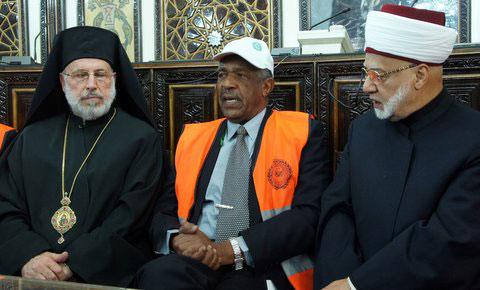Grand Strategy, Iran, and the Arab Spring
 This week, President Mahmoud Ahmadinejad of Iran asserted that Iran was ready for negotiations on its nuclear (weapons) program. Indeed, he insisted that it always had been, and that European and American declarations to the contrary were, in fact, “excuses.” These remarks were seen as a response to the EU’s exhortations that Iran “go back to negotiations” that were coupled with sanctions on Iranian oil. It is still unclear whether Iran is signaling that it will cave to the strong economic and political pressure it has been subjected to or if it is merely stalling for time.
On another front, the United Nations has announced that the death toll in Syria has become too large to count; in any case, both the number of deaths and the announcement that the Free Syrian Army (FSA) seems to have certain cities and territories under its control, as well as the announcement that the Syrian National Council will be funding and arming the FSA, all seem to point to a civil war into which the country is precariously perched to descend, if it has not already. The most recent development was the withdrawal of the Arab League monitors due to the non-cooperation of the regime and the referral of the conflict to the United Nations Security Council.
This week, President Mahmoud Ahmadinejad of Iran asserted that Iran was ready for negotiations on its nuclear (weapons) program. Indeed, he insisted that it always had been, and that European and American declarations to the contrary were, in fact, “excuses.” These remarks were seen as a response to the EU’s exhortations that Iran “go back to negotiations” that were coupled with sanctions on Iranian oil. It is still unclear whether Iran is signaling that it will cave to the strong economic and political pressure it has been subjected to or if it is merely stalling for time.
On another front, the United Nations has announced that the death toll in Syria has become too large to count; in any case, both the number of deaths and the announcement that the Free Syrian Army (FSA) seems to have certain cities and territories under its control, as well as the announcement that the Syrian National Council will be funding and arming the FSA, all seem to point to a civil war into which the country is precariously perched to descend, if it has not already. The most recent development was the withdrawal of the Arab League monitors due to the non-cooperation of the regime and the referral of the conflict to the United Nations Security Council.
Now of course, the Syrian regime’s most important supporter in the region is Iran. The conflict in Syria and the possible conflict that seems to be shaping up with Iran are not unrelated. Many foreign policy thinkers have interpreted the so-called “axis” between Iran, Syria, and Hezbollah as the most powerful countervailing force to Israel’s interests, and the prospect of an Iranian nuclear weapon has alarmed many in the region, including rival Sunni Arab states.
A cynical observer could ascribe much of Western democracies’ and Sunni dictatorships’ political support for the protesters and animosity towards the regime as pure realpolitik designed to weaken Iran’s alliance, and he probably would be right. It is quite unlikely that Saudi and Bahraini monarchs, who recently crushed the popular uprisings fueled by marginalized and poor Shiites in Manama, suddenly have begun to care about democratic ideals. Unfortunately, it has given ammunition to the regime and its supporters and made friends of democracy among the Arab world (and even the Diaspora) wary about standing against the regime. It has led to suspicion that outside powers, may, once again, may be manipulating the Arabs.
Israel has been more hesitant to support the revolution than others because it fears the potentiality of a more defiant Syria on its border. Ironically, Israel seems to prefer Assad to the unknown alternative, more so than any other state besides Iran. This may not be surprising, but it is a poor choice for the long term. Yet even an angry Syria, ruled by a democratic nation, would be unlikely to want to remain so strongly allied with Iran.
Most unsettlingly, the whispers of wars that have been increasing in recent months suggest a frightening scenario of war in the Middle East. Even though the United States has revealed plans to scale back its military forces and has just withdrawn from Iraq, the political capital to apply the brakes to Israel’s military hawks may not be available in an election year, with both the left and right struggling for as many votes across the spectrum as they can. An attack on Iran’s nuclear program could cause a disastrous and regional war, drawing in Hezbollah and placing Syria right in the middle, and time before the bomb is rapidly running out. Such a war would have severely negative repercussions for the striving revolution or, if Assad falls, fledgling democracy, for which Syrians have fought so hard. The distraction of the current chaos in Syria, although certainly caused by repression and internal grievances, could be seen by the war hawks as a perfect diversion to strike.
In any case, Syrians will have to struggle to remain free of the chains of outside influence from both pro- and anti-Iranian sides. Syria’s independence hangs in the balance, but perhaps due to its strategic importance, perhaps so does the region as well.
